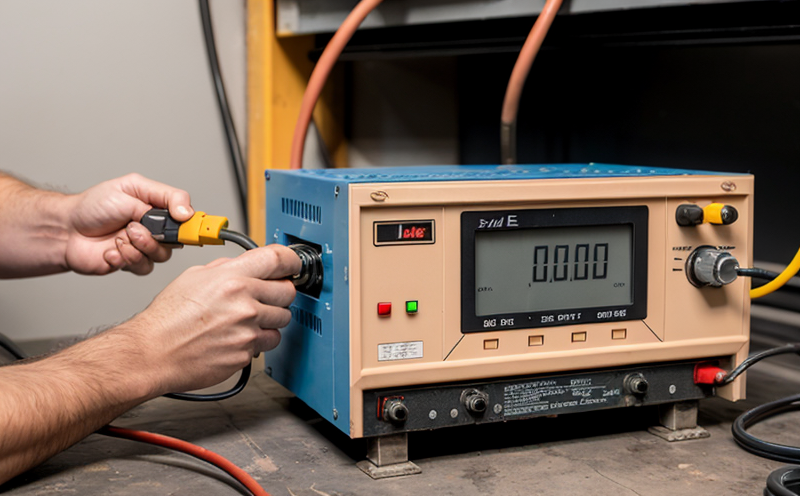IEC 60749-68 Die Operational Lifetime Testing
The IEC 60749-68 standard is a crucial benchmark for ensuring the reliability and durability of semiconductor devices at the die level. This type of testing focuses on assessing how long a die can perform its intended function under specified operating conditions before it fails or degrades to an unacceptable level.
The primary objective of this service is to simulate real-world operational stresses that a microchip might encounter during its lifecycle, thereby identifying any potential weaknesses in the design. This comprehensive testing ensures that manufacturers and purchasers have confidence in the longevity and performance of their products under expected usage scenarios.
At [Your Company], we adhere strictly to IEC 60749-68 guidelines when conducting this service. Our state-of-the-art facilities utilize advanced instrumentation tailored specifically for die-level testing, ensuring accurate and reliable results every time. We also provide detailed reports that outline all test parameters, specimen preparation procedures, equipment used, and the final outcomes of each evaluation.
Our team of experienced engineers ensures that every aspect of the test adheres to industry best practices as defined by IEC 60749-68. By leveraging this standard, we can help our clients comply with regulatory requirements while enhancing their product quality and safety standards. Our dedicated approach guarantees consistent accuracy throughout each stage of testing.
Die operational lifetime testing is essential for several reasons:
- To verify that the semiconductor devices meet specific performance criteria over extended periods.
- To identify any design flaws or manufacturing defects early in the development process.
- To ensure compliance with international safety and quality standards.
- To provide data that can be used to improve future product designs.
By investing in this type of testing, companies demonstrate their commitment to delivering high-quality products. This not only protects end-users but also enhances brand reputation by building trust between the manufacturer and its customers.
The benefits extend beyond just meeting compliance requirements; they include:
- Enhanced product reliability leading to reduced warranty costs.
- Potential cost savings due to early detection of issues during development stages.
- Better understanding of how various environmental factors affect the performance of your devices.
- Improved decision-making capabilities based on empirical evidence rather than assumptions.
We pride ourselves on providing thorough, accurate, and timely results that contribute significantly to our clients' overall success. If you're looking for reliable partners in semiconductor and microchip testing services, look no further than [Your Company]. Let us help ensure your products stand up to the toughest environments while maintaining optimal performance.
Scope and Methodology
| Test Parameter | Description |
|---|---|
| Temperature Cycling | Cycles the sample through a range of temperatures to simulate exposure to extreme climates. |
| Voltage Stressing | Subjecting the die to voltages higher than normal operating levels to stress materials and structures. |
| Current Load Testing | Evaluates the current handling capability of the device under various conditions. |
| Die-to-Die Comparison | Compares operational characteristics between different dies within a single batch or across batches. |
The methodology involves several key steps:
- Sample Preparation: Cleanliness and proper orientation are critical to ensuring accurate test results.
- Initial Inspection: Visual inspection followed by non-destructive testing methods like X-ray imaging or cross-sectioning if necessary.
- Data Collection: Continuous monitoring of electrical parameters during the operational stress.
- Failure Analysis: Detailed examination to determine root causes of any failures observed.
This structured approach allows for precise evaluation and reporting, which is essential for maintaining high standards in semiconductor manufacturing.
Quality and Reliability Assurance
The IEC 60749-68 standard plays a pivotal role in ensuring quality assurance and reliability within the semiconductor industry. By adhering to these stringent guidelines, manufacturers can guarantee that their products meet rigorous performance expectations even under adverse conditions.
Our commitment to excellence means we employ cutting-edge technology paired with meticulous attention to detail during every phase of the testing process. From initial sample preparation through final analysis and reporting, our team works closely with clients to ensure all aspects align perfectly with IEC 60749-68 specifications.
The importance of this standard cannot be overstated; it helps protect consumers from potentially dangerous products while fostering innovation by providing a solid foundation for new developments. By investing in thorough testing, companies can build stronger relationships with their customers and earn greater trust across industries.
Customer Impact and Satisfaction
- Increased confidence among end-users regarding product reliability.
- Potential reduction in warranty claims due to increased durability.
- Enhanced reputation for adhering to international standards, thus attracting more business opportunities.
- Early identification of design weaknesses resulting in cost savings during development phases.
The positive impact extends beyond just the immediate benefits; satisfied customers lead to long-term partnerships and continued success. Our dedicated team aims not only to meet but exceed expectations through consistent quality assurance practices.





